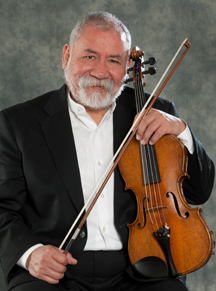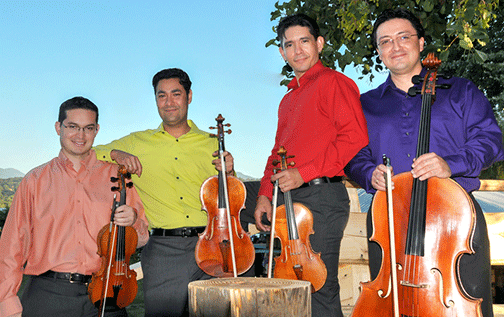Chamber Music Concert Features String Quartet
March 14, 2019
SOCORRO, N.M. – La Catrina String Quartet will join Willy & Friends host and violist Willy Sucre in the fourth and final concert in the N.M. Tech Presidential Chamber Music Series at 7:30 p.m. Saturday, March 23, at N.M. Tech’s Macey Center.
Fans of the Chamber Music Series should take note that this is the only concert of the season that is NOT on a Monday.
Sponsored by N.M. Tech President Dr. Stephen G. Wells and Socorro Springs, admission is free to all ages, and is offered through the university’s Performing Arts Series (PAS).
 Joined by Willy Sucre on viola, the La Catrina String Quartet will perform the music
of Heitor Villa-Lobos, Paquito D’Rivera, Julián Plaza and Ludwig van Beethoven.
Joined by Willy Sucre on viola, the La Catrina String Quartet will perform the music
of Heitor Villa-Lobos, Paquito D’Rivera, Julián Plaza and Ludwig van Beethoven.
“Willy has been a part of the classical musical history at Tech for more than 30 years, and he has devoted his life to arranging programs that showcase the diversity of chamber music,” said PAS Director Ronna Kalish. “We are grateful to him and the talented musicians who have graced our stage over the years.
“We also thank President Wells for continuing the Presidential Chamber Concert Series, a cornerstone of the history of the performing arts history of Socorro and New Mexico Tech for many years,” she said.
La Catrina String Quartet (pictured below) is comprised of Daniel Vega-Albela and Simón Gollo, violin; Jorge Martínez Ríos, viola; and Jorge Espinoza, cello. As a nationally and internationally recognized new vanguard for contemporary Latin American quartet repertoire, the quartet tours regularly throughout the U.S. and Mexico.
 The evening’s program features the four movements of String Quartet No. 17 by Heitor
Villa-Lobos, Quartet in C minor by Paquito D’Rivera, Payadora composed by Julián Plaza
(arranged by Jorge Espinoza) and the four movements of Beethoven’s Viola Quintet in
C Major, Op. 29.
The evening’s program features the four movements of String Quartet No. 17 by Heitor
Villa-Lobos, Quartet in C minor by Paquito D’Rivera, Payadora composed by Julián Plaza
(arranged by Jorge Espinoza) and the four movements of Beethoven’s Viola Quintet in
C Major, Op. 29.
The evening’s eclectic and electrifying program combines the work of relatively modern composers with that of a crucial figure in the transition between the Classical and Romantic eras in classical music.
Heitor Villa-Lobos (1887-1959) was a Brazilian composer, conductor, cellist, pianist, and guitarist. He has been described as “the single most significant creative figure in 20th-century Brazilian art music.” He has become the best-known South American composer of all time.
The quartet consists of the traditional four movements: Allegro non troppo, Lento, Scherzo (Allegro vivace) and Allegro vivace (con fuoco).
Villa-Lobos wrote numerous compositions for orchestral, chamber, instrumental and vocal works, totaling over 2000 by his death in 1959. Biographers believe his music was influenced by Brazilian folk music and elements reflecting classical European traditions.
He composed his Seventeenth Quartet in Rio de Janeiro in 1957. It was first performed by the Budapest String Quartet on October 16, 1959, at the Library of Congress in Washington, D.C., exactly one month before the composer’s death.
Before returning to Rio, the mortally ill Villa-Lobos had given a copy of the score to the violinist Mariuccia Iacovino in Paris, and practically begged her to arrange a reading of it. However, the follies – or, the usual suspects – of misfortune, prevented this, and Villa-Lobos died without knowing the premiere had already taken place.
D’Rivera, born in Havana, Cuba in 1948, as a young man became dissatisfied with the constraints placed on his music in his native land. Arriving in the U.S., he was introduced to the jazz scene and concert halls in New York, and became something of a phenomenon after the release of his first two solo albums, Paquito Blowin' and Mariel.
In addition to his accomplishments as an instrumentalist, he has rapidly gained a dynamic reputation as a composer. His works often reveal his widespread and eclectic musical interests, ranging from Afro-Cuban rhythms and melodies to influences encountered in his many travels, in addition to his classical origins.
The music of Argentinean composer Plaza (1928-2003) has a special place in the history of tango. His music is spicy with cross rhythms and dissonance, but remains dance music par excellence. Payadora is a delightful mixture of old and new, and is one of the most famous tangos written by Plaza.
Its rhythm reflects sharp accents and spicy chords, both of which depict and inspire movements that mirror the sensual elements associated with the tango and those delightful moves where the leader “blocks” the foot of the follower in a sharp and percussive movement.
Viola Quintet in C Major, Op. 29, by Ludwig van Beethoven (1770-1827), consists of four movements: Allegro non troppo, Lento, Scherzo (Allegro vivace) and Allegro vivace (con fuoco), Beethoven’s only full-scale, original composition in the string quintet genre.
This work is scored for string quartet and an extra viola (two violins, two violas, and cello). Of interest is that it inspired Schubert to write his own string quartet in the same key, opting for two cellos, rather than two violas, as in Beethoven’s quintet.
Since its founding in 2007, La Catrina String Quartet has been committed to cultivating new works by living U.S. composers and throughout the Americas; programming existing Latin American works rarely performed in the U.S. and abroad; and bringing fresh interpretations to classical, romantic and 20th century masterpieces.
Mexico City native Daniel Vega-Albela received his Bachelor of Music degree in violin performance from the Mannes College of Music, and has played with many ensembles in the United States, Mexico and Japan. A devoted teacher, he is featured in the 2004 and 2005 editions of Who’s Who Among America’s Teachers.
Award-winning Swiss-Venezuelan violinist Simón Gollo has been a member of the Dali String Quartet, and is regularly invited by several other chamber music ensembles for tours and concerts given at venues such as Carnegie Hall in NYC and Cadogan Hall in London. In 2015 Simón Gollo joined La Catrina String Quartet.
Born in Torreón, Mexico, Jorge Martínez Ríos has performed in prestigious venues across the US and Mexico. Currently, Mr. Martinez is Assistant Professor of Viola at New Mexico State University and keeps a busy schedule touring and teaching.
Jorge Espinoza orchestral experiences include performances at the Kennedy Center with the National Symphony and chamber ensembles in Carnegie Hall, Lincoln Center and Symphony Hall. He has been a featured soloist and chamber musician, performing concertos, solo and chamber music recitals in his native land, Chile, and around the world.
Violist Willy Sucre is a member of the New Mexico Philharmonic and the driving force for the “Willy Sucre & Friends" concerts. Born in La Paz, Bolivia, Sucre’s experiences include chamber music concerts, lectures and school demonstrations, CD recordings, and television performances throughout South, Central and North America. He enjoys performing with ensembles of diverse instrumentation.
“I am grateful for this opportunity to thank everyone who has supported PAS and vital programs such as the Presidential Chamber Music Series,” Kalish said. “Please show your appreciation by being our guest – and Willy’s and La Catrina Quartet’s – at the concert on Saturday, March 23 at 7:30.”
– NMT –